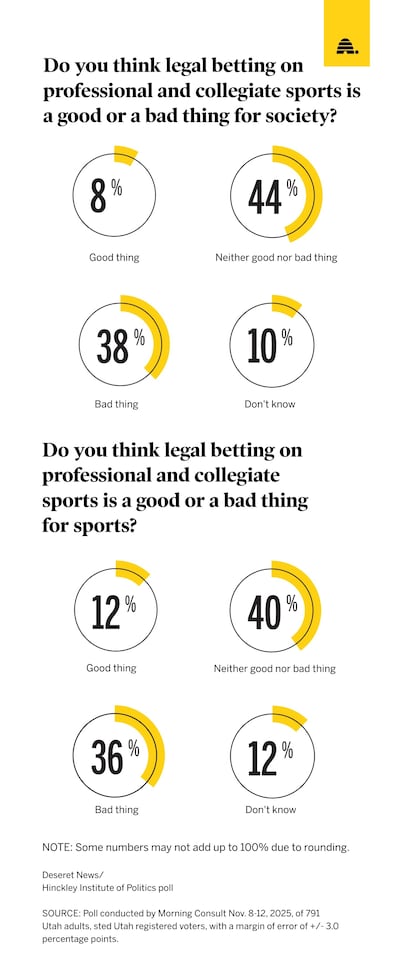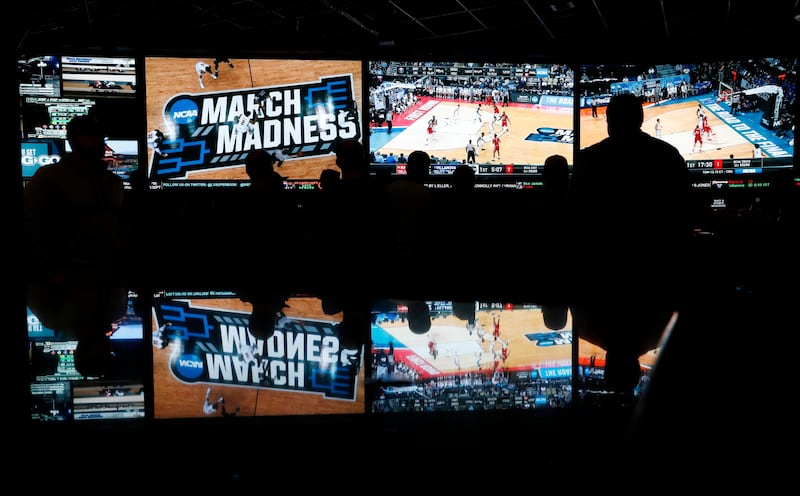- A new poll shows about 4 in 10 Utahns say sports betting is neither bad nor good for society.
- More baby boomers than GenZers and millennials see wagering on games as bad.
- Utah is one of two states that bans all forms of gambling.
Since the U.S. Supreme Court lifted a ban on commercial sports betting in 2018, 38 states have legalized it in some form, including 30 that allow wagers to be placed directly from a mobile phone. Utah is not one of them.
In fact, the Beehive State is one of two states in the country that prohibit all gambling, including sports betting, casino games, horse racing, lotteries and even bingo or raffles for charity. The ban is written into Utah’s constitution. The state also passed a law in 2012 allowing it to opt out of any federal law permitting internet gambling.
But that doesn’t mean Utahns don’t bet on sports or have opinions about it.
A new Deseret News/Hinckley Institute of Politics poll asked a representative sample of Utah adults whether sports betting is good or bad for society and whether it’s good or bad for sports.
When asked, “Do you think legal betting on professional and collegiate sports is a good or a bad thing for society?” 44% say it’s neither a good thing nor a bad thing. Just over a third, 38%, say it’s a bad thing, while 8% say it’s a good thing. Another 10% don’t know.

When asked, “Do you think legal betting on professional and collegiate sports is a good or a bad thing for sports?”, 40% say it’s neither a good thing nor a bad thing. Again, just over a third, 36%, say it’s a bad thing, while 12% say it’s a good thing. Another 12% don’t know.
Morning Consult conducted the poll of 791 Utah adults Nov. 8-12. It has a margin of error of plus or minus 3 percentage points.
Sports betting swept the nation in a hurry
Utahns’ attitudes about sports betting were close to those of Americans in general based on a nationwide Deseret News/Hinckley Institute poll asking the same two questions. People saying sports betting is neither bad nor good for society or sports were roughly the same. A higher percentage of Utahns, though, say it’s bad for both and a lower percentage say it’s good for both.
“I just feel like this all happened so quickly for people that they didn’t necessarily have a chance to digest what the stakes were, what the dangers were,” said journalist Danny Funt, who chronicled the rise of American sports gambling in a new book titled “Everybody Loses” due out in January.
“It happened so quickly that the gambling industry and their business partners had such a powerful lobby and public platform to assure people that this was, if not neutral, actually a good thing for sports and society.”
Funt said evidence of rising gambling addiction rates and dangers to public health along with personal finance issues such as higher bankruptcy rates, less savings and college students tapping into their tuition fund is trickling in.
“All of these studies and research projects are creating a mountain of bad news,” he said.
The Utah Attorney General’s Office declined a request for an interview about sports betting in Utah but provided a written statement from Attorney General Derek Brown: “Gambling is illegal in Utah and the Office of the Utah Attorney General works to uphold that law. We work with state and national partners to protect Utahns from the increased amount of gaming that is growing throughout the country.”
Breaking down the poll results
The Deseret News/Hinckley Institute poll generally found more younger Utahns and men see sports betting as a good thing than older people and women. Only 2% of baby boomers say it’s good for society and 4% good for sports. Nearly 6 in 10 say it’s bad for both.
Nearly 2 in 10 Gen Zers and millennials say it’s a good thing for sports but only about 10% say it’s good for society. About a quarter of those generations see sports betting as bad for sports and for society.
Broken down by political persuasion, more Republicans than Democrats in Utah say betting on sports is bad for society.
When it comes to whether it’s a good thing or a bad thing for sports, nearly a quarter of Democrats say it’s good compared to 1 in 10 Republicans.
Looking at income levels, 9% of Utahns earning $100,000 or less a year say sports betting is good for society, while 6% making over that amount agree. Nearly half at the higher income level say it’s bad, compared to just under a third of those under $50,000 annually.
As for whether sports betting is bad for sports, the higher the income, the higher the percentage of those who think it’s bad.
How much do Americans bet on sports?
Americans legally bet an estimated $150 billion on sports in 2024, according to the American Gaming Association. The sports betting industry posted record revenue of $13.71 billion in 2024, up from a record $11.04 billion the year before, per the association.
“Last year saw brick-and-mortar revenue growth slow, while online gaming and sports betting continued to grow,” AGA vice president of research David Forman said, per ESPN. “These past few years have reshaped the industry, and the revenue pie, while it’s much bigger, looks very different than it used to. That’s increasingly driven by new online gaming options available to more people than ever before.”
The organization contends the legal sports betting market brings needed tax revenue to states and communities while protecting consumers from the illegal market. States collected more than $1.8 billion in tax revenue from sports betting taxes in fiscal year 2023, according to the Tax Foundation.
Funt said the big influx of dollars comes with an asterisk because it doesn’t come from nowhere but comes from people betting “staggering” amounts of money. And, he said, the tax revenue it generates is considerably less than hoped and is a drop in the bucket as far as state budgets go.
But lawmakers, he said, can point to sports betting as another source of revenue. And the sports leagues now entangled with gambling businesses are doing great.
“So, it might not be good for sports as in the on-field product but it’s good for the business of sports in some respects because they’re making billions of dollars off this,” Funt said.



